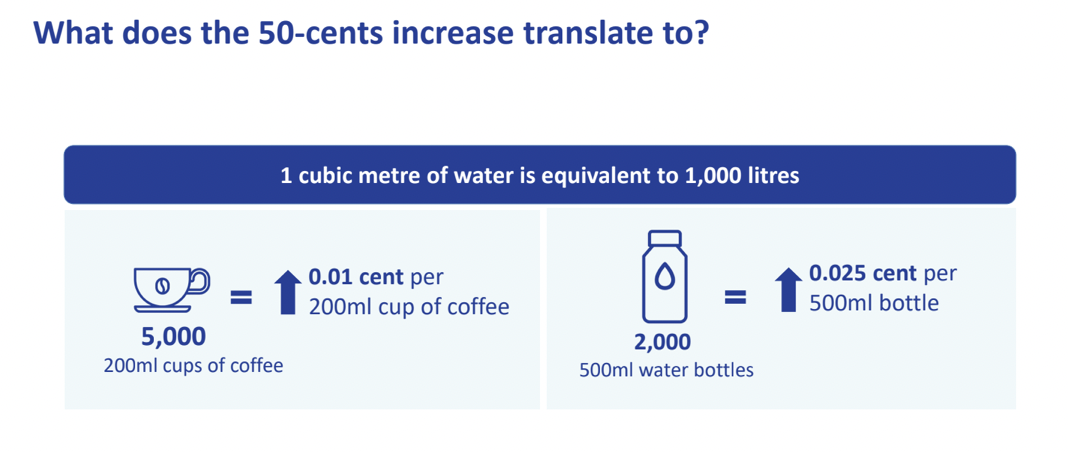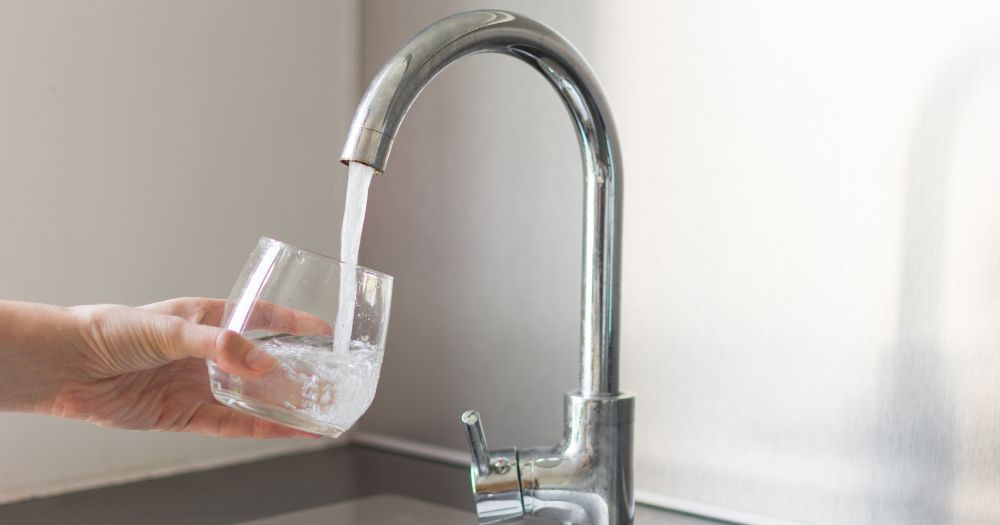The price of water in Singapore is set to increase by 50 cents per cubic metre over the next two years, equivalent to a price hike of around 18 per cent.
National water agency PUB announced on Sep. 27 that this increase reflects the rising costs of producing and supplying water, citing factors such as the rising demand of water and external cost pressures.
In light of the water price increase and other cost of living concerns, the government will provide additional financial support, particularly for lower- and middle-income households.
More details on this will be announced by the Ministry of Finance soon.
Phased approach
The current water price is set at S$2.74 per cubic metre.
The price increase will be implemented in two phases — water price will first increase by 20 cents per cubic metre from Apr. 1, 2024, followed by an increase of 30 cents per cubic metre from Apr. 1, 2025.
This would represent an increase in water price of about 2.5 per cent per year since the last price revision.
 Image by PUB.
Image by PUB.
The last time the water price was revised was a 30 per cent hike in 2017.
The phased approach, PUB explained, is meant to help households and businesses adjust to the increase, as well as allow more time for them to adopt water conservation measures.
Meanwhile, the price of NEWater will increase by 17 cents per cubic metre in two phases as well.
Deferring water price increase would lead to "snowballing effect"
PUB shared that the decision to increase water prices was a "considered and very careful" one, and to defer the price hike any later would lead to a "snowball[ing]" effect, and an even more significant price increase in the future.
PUB added that "even with active cost mitigation measures" by the agency and its contractors, the cost of producing and supplying water has "increased substantially" since the 2017 price revision.
This is mainly due to external cost pressures — increases in energy, construction, chemicals and maintenance costs.
Due to the unpredictability and increased frequency of extreme weather events caused by climate change, such as prolonged drought, PUB has been tapping more on weather-resilient water sources such as NEWater and desalination.
However, these two sources are more energy-intensive and expensive to produce, compared to the conventional water treatment process, and as average electricity market tariffs have increased by around 37 per cent, PUB faces rising energy costs.
Construction costs have also gone up by 35 per cent, while PUB's expenses for essential chemicals for water treatment have increased by around 33 per cent.
Additionally, maintenance costs have risen by 18 per cent due to higher manpower costs for contracted services.
Higher manpower and construction costs
Take the construction of the Deep Tunnel Sewerage System (DTSS) for example, the second phase of construction will cost a total of S$6.5 billion.
That is twice that of phase one when it was built two decades ago and this is due to higher manpower and construction costs.
Furthermore, the cost of constructing the deep tunnels has more than tripled in phase two.
DTSS is a major infrastructure project by the national water agency as it will channel wastewater from western Singapore to the upcoming Tuas Water Reclamation Plant.
Around a third of the Tuas Water Reclamation Plant, a key component of the DTSS, has been completed, PUB shared on Sep. 22.
DTSS will free up 150 hectares of land used by water infrastructure, and will require less energy as water is conveyed using gravity.
In addition to these external cost pressures contributing to the water price increase, Singapore's water demand is expected to double by 2065.
The price increase will enable PUB to sustain its operations, build new assets and renew existing assets to deliver good and reliable water supply to Singapore residents.
Financial support to be provided
With the water price increase, PUB noted that from April 2025, three quarters of households will see an increase of less than S$10 in their monthly water bills, before government support.
Similarly, three quarters of businesses will see an increase of less than S$25 in their monthly water bills.
In light of this price increase and other cost of living concerns, such as the GST hike and public transport fare increases, the government will provide additional financial support, particularly for lower- and middle-income households.
MOF will announce more details on this soon.
PUB will also work with the Ministry of Trade and Industry and relevant authorities to advise against profiteering by businesses.
Households can also receive further support with PUB's and the National Environment Agency's (NEA) Climate Friendly Households Programme, where all one-, two- and three-room households can apply for e-vouchers to offset the costs of installing water-efficient appliances.
Businesses can also tap on PUB's Water Efficiency Fund to implement water recycling and water-efficient systems and technologies.
Top photo from Canva
If you like what you read, follow us on Facebook, Instagram, Twitter and Telegram to get the latest updates.



